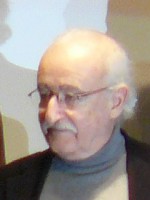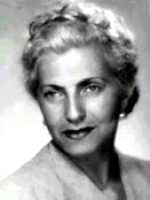Ján Kadár is a Director and Scriptwriter Tchecoslovaque born on 1 april 1918 at Budapest (Hongrie)

Ján Kadár (1 April 1918 – 1 June 1979) was a Slovak film writer and director. As a filmmaker, he worked in Slovakia, the Czech Republic, the United States, and Canada. Most of his films were directed in tandem with Elmar Klos. The two became best known for their Oscar-winning The Shop on Main Street (Obchod na korze, 1965). As a professor at the FAMU (Film and TV School of the Academy of Performing Arts) in Prague, Kadár trained most of the directors who spawned the Czechoslovak New Wave in the 1960s.
After moving to the United States, he became professor of film direction at the American Film Institute in Beverly Hills. His personal life as well as his films encompassed and spanned a range of cultures: Jewish, Slovak, Hungarian, Czech, and American.
Après la guerre, Ján Kadár commence sa carrière de réalisateur avec un documentaire sur les ravages causés par le conflit. À partir de 1952, il amorce une longue collaboration avec Elmar Klos, collaboration qui durera jusqu'en 1968. Ensemble, Kadar et Klos réalisent notamment La Mort s'appelle Engelchen, un drame de guerre qui remporte un prix important au festival de Moscou en 1963. Leur œuvre suivante, L'accusé, reçoit le Globe de cristal au festival de Karlovy-Vary en 1964. Puis leur film Le Miroir aux alouettes, drame se déroulant en Slovaquie pendant la deuxième guerre mondiale, est présenté au festival de Cannes avant de devenir le premier film tchèque à recevoir l'Oscar du meilleur film étranger.
Après l'invasion soviétique de 1968, Ján Kadár décide de quitter la Tchécoslovaquie et va s'établir aux États-Unis, à l'instar de ses collègues Vojtěch Jasný, Miloš Forman et Ivan Passer. Elmar Klos, de son côté, restera en Tchécoslovaquie mais ne tournera pratiquement plus.
La carrière américaine de Ján Kadár commence avec The Angel Levine, un conte fantastique mettant en vedette Zero Mostel et Harry Belafonte. Kadar vient ensuite au Canada pour y tourner Lies My Father Told Me, une comédie dramatique située dans le milieu juif orthodoxe montréalais des années 1920. Le film obtient un succès certain et reçoit une nomination aux Oscars (scénario) et deux nominations aux Golden Globes en plus de remporter le grand prix du cinéma canadien.
De retour à Hollywood, Ján Kadár commence à travailler pour la télévision. Sa dernière réalisation sera le télé-film Freedom Road, drame historique adapté d'un roman de Howard Fast et mettant en vedette le boxeur Mohamed Ali. Ján Kadár meurt à Los Angeles, à l'âge de 61 ans.
Source : Wikidata
Ján Kadár

- Infos
- Photos
- Best films
- Family
- Characters
- Awards
Birth name János Kadár
Nationality Tchecoslovaquie
Birth 1 april 1918 at Budapest (Hongrie)
Death 1 june 1979 (at 61 years) at Los Angeles (USA)
Awards National Artist
Nationality Tchecoslovaquie
Birth 1 april 1918 at Budapest (Hongrie)
Death 1 june 1979 (at 61 years) at Los Angeles (USA)
Awards National Artist
After moving to the United States, he became professor of film direction at the American Film Institute in Beverly Hills. His personal life as well as his films encompassed and spanned a range of cultures: Jewish, Slovak, Hungarian, Czech, and American.
Biography
Ján Kadár est né à Budapest en 1918. Au cours des années 1930, il étudie à l'école de cinéma de Bratislava. Pendant la seconde guerre mondiale, Kadar et sa famille sont arrêtés et envoyés dans un camp de concentration.Après la guerre, Ján Kadár commence sa carrière de réalisateur avec un documentaire sur les ravages causés par le conflit. À partir de 1952, il amorce une longue collaboration avec Elmar Klos, collaboration qui durera jusqu'en 1968. Ensemble, Kadar et Klos réalisent notamment La Mort s'appelle Engelchen, un drame de guerre qui remporte un prix important au festival de Moscou en 1963. Leur œuvre suivante, L'accusé, reçoit le Globe de cristal au festival de Karlovy-Vary en 1964. Puis leur film Le Miroir aux alouettes, drame se déroulant en Slovaquie pendant la deuxième guerre mondiale, est présenté au festival de Cannes avant de devenir le premier film tchèque à recevoir l'Oscar du meilleur film étranger.
Après l'invasion soviétique de 1968, Ján Kadár décide de quitter la Tchécoslovaquie et va s'établir aux États-Unis, à l'instar de ses collègues Vojtěch Jasný, Miloš Forman et Ivan Passer. Elmar Klos, de son côté, restera en Tchécoslovaquie mais ne tournera pratiquement plus.
La carrière américaine de Ján Kadár commence avec The Angel Levine, un conte fantastique mettant en vedette Zero Mostel et Harry Belafonte. Kadar vient ensuite au Canada pour y tourner Lies My Father Told Me, une comédie dramatique située dans le milieu juif orthodoxe montréalais des années 1920. Le film obtient un succès certain et reçoit une nomination aux Oscars (scénario) et deux nominations aux Golden Globes en plus de remporter le grand prix du cinéma canadien.
De retour à Hollywood, Ján Kadár commence à travailler pour la télévision. Sa dernière réalisation sera le télé-film Freedom Road, drame historique adapté d'un roman de Howard Fast et mettant en vedette le boxeur Mohamed Ali. Ján Kadár meurt à Los Angeles, à l'âge de 61 ans.
Best films
Usually with
Filmography of Ján Kadár (6 films)
Director
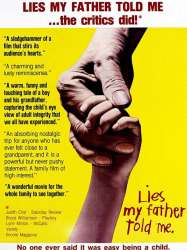
Lies My Father Told Me (1975)
, 1h42Directed by Ján Kadár
Origin Canada
Genres Drama
Themes Films about religion, Films about Jews and Judaism
Actors Yossi Yadin, Marilyn Lightstone, Ted Allan, Bertrand Gagnon, Guy L'Écuyer, Diana Leblanc
Rating66%





The story tells of a six-year-old boy who would travel with his grandfather on an old horse-drawn cart through the alleyways in a Jewish ghetto of Montreal in the 1920s. The two would call out to residents asking to collect their old junk (a rag-and-bone man). The boy's grandfather was religious but his father was not. Eventually the grandfather dies, as does his horse Ferdeleh, leaving the boy feeling bitter toward his secular father.
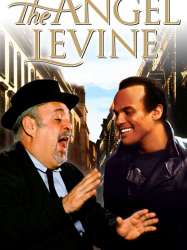
The Angel Levine (1970)
, 1h46Directed by Ján Kadár
Origin USA
Genres Drama
Themes Films about religion, Films about Jews and Judaism
Actors Zero Mostel, Harry Belafonte, Ida Kamińska, Milo O'Shea, Gloria Foster, Eli Wallach
Rating60%






The Shop on Main Street (1965)
, 2h5Directed by Ján Kadár, Elmar Klos
Origin Tchecoslovaquie
Genres Drama, War
Themes Films about religion, Political films, Films about Jews and Judaism
Actors Ida Kamińska, František Zvarík, Juraj Herz, Ivan Palúch
Rating81%





During World War II, a mild-mannered Slovak carpenter Anton "Tóno" Brtko (Jozef Kroner) is offered the chance to take over the sewing notions store of an old, near-deaf Jewish woman Rozália Lautmannová (Ida Kamińska) as a part of the enactment of an Aryanization regulation in the town. As Tóno attempts to explain to Mrs. Lautmannová, who is oblivious of the world outside and generally confused, that he has come to be her supervisor and owner of the store, Imrich Kuchár (Martin Hollý, Sr.), a Slovak opponent of Aryanization, steps in and reveals to Brtko that the business itself is less than profitable, as Lautmannová herself relies on donations. The Jewish community then offers the amiable Brtko a weekly payment if he does not give up the store, which would otherwise be given to a new, possibly ruthless Aryanizer. Tóno accepts and lets Mrs. Lautmannová believe he is her nephew who has come to help in the store. Their relationship grows, until the authorities round up the town's entire Jewish population for transport, and Tóno finds himself conflicted as to whether he should turn in the senile Mrs. Lautmannová, or hide her. When the woman finally becomes aware of the "pogrom" all around her, she panics, and in attempting to silence her, Tóno accidentally kills her. The realization devastates him, and he hangs himself.
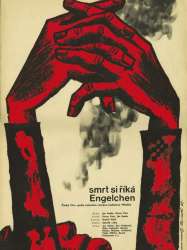
Death Is Called Engelchen (1963)
, 1h51Directed by Ján Kadár, Elmar Klos
Genres Drama, War
Actors Antonín Molčík, Čestmír Řanda, Otto Šimánek, Ota Sklenčka, Věra Tichánková
Rating74%






At the Terminus (1957)
Directed by Ján Kadár, Elmar Klos
Genres Drama
Actors Jana Dítětová, Hana Hegerová, Josef Kemr, Stella Zázvorková
Rating71%





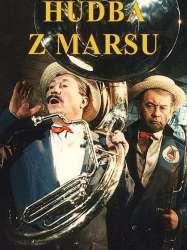
Music from Mars (1955)
Directed by Ján Kadár, Elmar Klos
Genres Comedy, Musical
Actors Jaroslav Marvan, Oldřich Nový, Otomar Krejča, Jaroslav Vojta, Lubomír Lipský, Eman Fiala
Rating57%





Scriptwriter

The Shop on Main Street (1965)
, 2h5Directed by Ján Kadár, Elmar Klos
Origin Tchecoslovaquie
Genres Drama, War
Themes Films about religion, Political films, Films about Jews and Judaism
Actors Ida Kamińska, František Zvarík, Juraj Herz, Ivan Palúch
Rating81%





During World War II, a mild-mannered Slovak carpenter Anton "Tóno" Brtko (Jozef Kroner) is offered the chance to take over the sewing notions store of an old, near-deaf Jewish woman Rozália Lautmannová (Ida Kamińska) as a part of the enactment of an Aryanization regulation in the town. As Tóno attempts to explain to Mrs. Lautmannová, who is oblivious of the world outside and generally confused, that he has come to be her supervisor and owner of the store, Imrich Kuchár (Martin Hollý, Sr.), a Slovak opponent of Aryanization, steps in and reveals to Brtko that the business itself is less than profitable, as Lautmannová herself relies on donations. The Jewish community then offers the amiable Brtko a weekly payment if he does not give up the store, which would otherwise be given to a new, possibly ruthless Aryanizer. Tóno accepts and lets Mrs. Lautmannová believe he is her nephew who has come to help in the store. Their relationship grows, until the authorities round up the town's entire Jewish population for transport, and Tóno finds himself conflicted as to whether he should turn in the senile Mrs. Lautmannová, or hide her. When the woman finally becomes aware of the "pogrom" all around her, she panics, and in attempting to silence her, Tóno accidentally kills her. The realization devastates him, and he hangs himself.
 Connection
Connection

